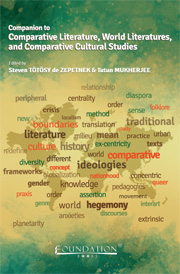Book contents
- Frontmatter
- Contents
- Introduction to the Companion to Comparative Literature, World Literatures, and Comparative Cultural Studies
- PART 1 Theories of Comparative Literature, World Literatures, and Comparative Cultural Studies
- PART 2 Comparative Literature in World Languages
- African Literatures as World Literatures
- Comparative Literature in Arabic
- Comparative Poetics in Chinese
- Comparative Literature in French
- Comparative Literature in German
- Comparative Literature in Iberian Spanish and Portuguese
- Comparative Literature in Indian Languages
- Comparative Literature in Italian
- Comparative Literature in Latin American Studies
- Comparative Literature in Russian and in Central and East Europe
- Comparative Literature in the United States
- PART 3 Examples of New Work in Comparative Literature, World Literatures, and Comparative Cultural Studies
- PART 4 Multilingual Bibliography of Books in Comparative Literature, World Literatures, and Comparative Cultural Studies
- Index
Comparative Literature in Iberian Spanish and Portuguese
from PART 2 - Comparative Literature in World Languages
Published online by Cambridge University Press: 05 April 2014
- Frontmatter
- Contents
- Introduction to the Companion to Comparative Literature, World Literatures, and Comparative Cultural Studies
- PART 1 Theories of Comparative Literature, World Literatures, and Comparative Cultural Studies
- PART 2 Comparative Literature in World Languages
- African Literatures as World Literatures
- Comparative Literature in Arabic
- Comparative Poetics in Chinese
- Comparative Literature in French
- Comparative Literature in German
- Comparative Literature in Iberian Spanish and Portuguese
- Comparative Literature in Indian Languages
- Comparative Literature in Italian
- Comparative Literature in Latin American Studies
- Comparative Literature in Russian and in Central and East Europe
- Comparative Literature in the United States
- PART 3 Examples of New Work in Comparative Literature, World Literatures, and Comparative Cultural Studies
- PART 4 Multilingual Bibliography of Books in Comparative Literature, World Literatures, and Comparative Cultural Studies
- Index
Summary
Abstract: In their article “Comparative Literature in Iberian Spanish and Portuguese” María Teresa Vilariño Picos and Anxo Abuín González present the current situation of comparative literature in the region. Their description of the discipline's intellectual and institutional situation suggests that starting with the mid-twentieth century scholars on the Iberian peninsula adopted comparative literature's theory orientation and proceeded in applying the framework in the study of literature. Vilariño Picos and Abuín González pay particular attention to the development of intermediality and digital humanities, fields which attract scholars who work in comparative literature in particular and produce(d) seminal scholarship. Further, they suggest that scholarship ought to place emphasis of the value of the local in a global context and to explore linguistic difference, while at the same time accompanying this exploration with theoretical reflection on the importance of digital humanities.
Introduction
We should not be surprised—given the lamentations about the state of affairs of comparative literature since its inception in the nineteenth century—that the discipline is associated with “crisis” (see, e.g., Gumbrecht and Moser). The reasons for this view are multiple and well-known. Not least important is the decline of the study of literature conceived as an expression of national identity, as was traditionally the case in comparative literature. We now know that the crisis of the discipline was accompanied by a considerable extension of its area of study and its implication with other spheres of thought.
- Type
- Chapter
- Information
- Companion to Comparative Literature, World Literatures, and Comparative Cultural Studies , pp. 284 - 298Publisher: Foundation BooksPrint publication year: 2014

